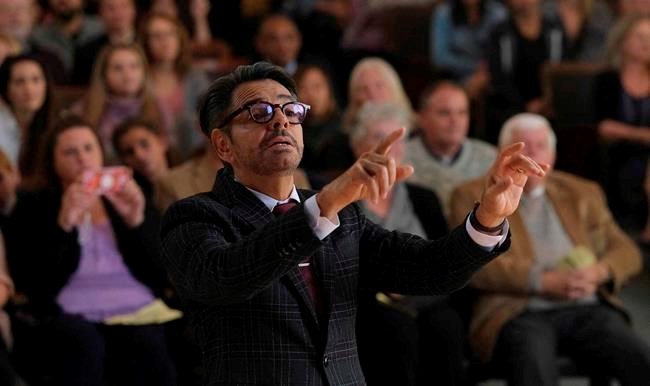NEW YORK — The breakout hit of this year’s Sundance Film Festival is set to expand the conversation about diversity in Hollywood.
“CODA,” which stands for “Child of Deaf Adults,” invites viewers into a world many have never seen, with a silence they’ve never experienced. It depicts the life of a mostly deaf family whose love, friction, drama and laughter is the same as any other family, but communicated through sign language.
The movie, a remake of the award-winning 2014 French film “La Famille Bélier,” won the festival’s top audience and grand jury awards and set a Sundance record by selling to Apple for $25 million.
Written and directed by Sian Heder, it was shot in Gloucester, Massachusetts, during the summer of 2019. The movie follows Ruby, the only hearing person in her New England family, as she contemplates leaving their struggling fishing business — and her role as their interpreter — to pursue her own dreams at the Berklee College of Music. The family is forced to figure out how they’ll survive without her.
Deaf actors Troy Kotsur, Daniel Durant and Marlee Matlin — the only deaf actor to win an Oscar — play Ruby’s family. Emilia Jones stars as Ruby.
Jones wasn’t an obvious choice to play the role of Ruby, which demanded singing and knowledge of American Sign Language. The 18-year-old British actor had no formal training in either.
“I remember thinking whoever is lucky enough to be able to play Ruby is a very, very, very lucky girl because it’s not very often that you have so many skills that you can learn for a film. I had to learn sign language. I’ve never had a singing lesson before we started,” she said. “But I love, I love, I love a challenge and I love a film that will educate me and make me grow as a person.”
The film highlights the humanity of those with disabilities while dispelling myths, showing in one instance how deaf people experience music. Ruby and her brother tease and sign profane insults at each other, while their parents’ extremely active sex life plays out in awkward, hysterical situations.
“The first thing that came to mind is my daughter, who is a real-life CODA. And when I read it over, that gave me some flashbacks based on my experience in this world,” said Kotsur, recalling first reading the script. “It’s a good experience for the audience to come into deaf culture and get an inside view of what it looks like.”
During filming, two ASL experts reviewed the script, helped Heder interpret the scenes and relay messages to the cast. They also made adjustments if scenes were not true to deaf culture. Subtitles are used when family members are communicating with each other, but only Ruby’s translations are heard when they speak with hearing people.
Matlin, who won the best actress Academy Award in 1987 for “Children of a Lesser God,” says “CODA” is “the full package” in portraying the deaf community on screen.
“No
“For people who have never seen deaf people or have never even seen sign language and they think that the we’re all the same, that we live the same way, that we come from the same mind-set, we are not,” said Matlin. “We are as varied as people who can hear, and this is one facet of the deaf community.”
Heder and the actors say they hope “CODA” challenges Hollywood. Although diversity has been a hot topic in recent years, discussions are generally
“When we started casting … I think everyone needed to be educated. I remember people saying, ‘Well, are there deaf actors out there?’ And there are a world of deaf actors out there,” she said. “Troy is incredibly talented and he won this part, but there were other amazing actors that came in and auditioned for that role. And I would say that about every role across the board.”
According to the Centers for Disease Control and Prevention, 1 in 4 U.S. adults — approximately 61 million people — has a disability that impacts major life activities. A 2017 study from the University of Southern California’s Annenberg School for Communication and Journalism found that just 2.7% of characters in the 100 highest-earning movies in 2016 were disabled, revealing the huge chasm between the population and what’s on screens.
There have been advances in recent years. Zack Gottsagen, an actor with Down syndrome, won acclaim starring in 2019’s “The Peanut Butter Falcon” alongside Shia LaBeouf. Deaf actor Lauren Ridloff will portray Marvel’s first deaf superhero in Chloe Zhao’s “The Eternals,” set for release in November. Last week, NBCUniversal announced that it will commit to auditioning actors with disabilities for each new studio production in hopes to increase disability representation on screen.
Heder hopes the entertainment industry expands its thinking when it comes to casting.
“(Filmmakers) have a role in their script that says ‘open ethnicity,’ but they don’t think to add that this could be open to someone with a disability or you could cast a deaf person in that role,” she said. “The more awareness people have, in writers’ rooms, directors, creators (will) start to open up their minds and understand that inclusion really means other things.”
___
Follow Associated Press entertainment journalist Gary Gerard Hamilton at twitter.com/GaryGHamilton
Gary Gerard Hamilton, The Associated Press



